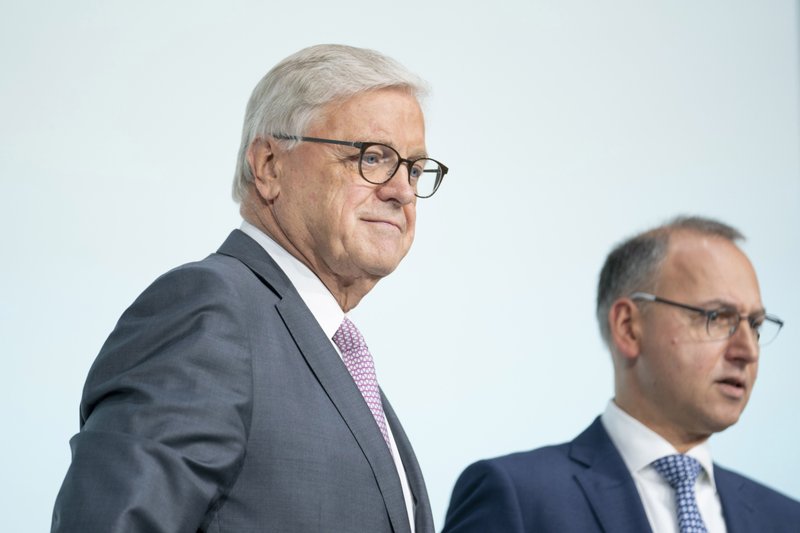Bayer Chairman Werner Wenning is leaving the German drugs and chemicals company before his term expires, capping a half-century of deal-making that culminated in the Monsanto acquisition and a blizzard of lawsuits over its Roundup weedkiller.
Wenning, 73, will be succeeded in April by Norbert Winkeljohann, 62, who joined Bayer's supervisory board in May 2018 just before the Monsanto deal closed. The $63 billion purchase was the brainchild of Wenning and Chief Executive Officer Werner Baumann, who was censured by shareholders at last year's annual meeting.
Bayer bought Monsanto in order to solidify its hold on the lucrative agricultural chemicals and seeds market. But the transaction has saddled Bayer with suits from tens of thousands of plaintiffs who say the Roundup herbicide causes cancer. Wenning said he wanted to leave last year but was asked to stick around "in view of the company's situation at that time," with investors in open rebellion and legal challenges to Roundup mounting.
"The timing of the change in board leadership is surprising but appropriate," said Janne Werning, head of environmental, social and governance at Union Investment, one of Bayer's top shareholders. Wenning was tightly linked to the "current difficult situation, and independent oversight of Bayer's further strategic development is needed now."
Bayer shares were little changed Wednesday in Frankfurt. The stock has lost about 4% this year. Over the course of 2018, the year the Monsanto deal closed, Bayer lost 41% of its value as investors questioned the strategy and risks of the giant acquisition.
Major investors -- including U.S. billionaire Paul Singer's Elliott Management Corp. -- pushed Bayer toward settlement talks with at least 42,700 plaintiffs who claim that Roundup causes cancer. Bayer maintains there's no link but agreed to postpone some further trials and give mediation a chance after losing three California cases that resulted in combined damages of $191 million. At least a half-dozen trials scheduled to start this month and next have been put on hold. Bayer is appealing the verdicts it lost.
With the chairman gone, "it's probably going to add to investor expectations that management change is likely to accompany any potential resolution on litigation in the U.S. rather than the reverse," said Emmanuel Papadakis, an analyst at Barclays in London. Winkeljohann is "something of an unknown quantity to the majority of Bayer investors" and is likely to bring a fresh pair of eyes to the business, he said.
Wenning has been chairman since 2012 and was CEO of the company, based in Leverkusen in western Germany, from 2002 until 2010. He groomed Baumann for years, and the two are regarded as extremely close, plotting out the Monsanto acquisition as early as 2015, before Baumann was even CEO. Wenning's departure could offer Baumann more flexibility to steer Bayer in different directions if the Roundup litigation can be resolved soon.
Baumann's job is probably safe for now, since investors don't want to shake up the supervisory board and management team simultaneously, said Ingo Speich, head of corporate governance for Deka Investment, another top Bayer holder. Meanwhile, Winkeljohann brings a fresh eye to Bayer's Monsanto troubles, but he's "missing experience in the U.S. and in the pharma and agriculture sectors," Speich said.
Some investors want to see Bayer ultimately split up into distinct crop science and pharmaceutical divisions, a strategy so far not endorsed by Wenning, who has sought to keep whole the company where he has worked his entire adult life. Speich said that Bayer should first focus on resolving the Roundup litigation, then on improving its pharma pipeline and crop science strategy. "It's far too early" to consider breaking up the company, he said.
Baumann's contract runs through April next year. The company is due to report earnings today. Wenning's original term was set to expire in 2022.
Winkeljohann is the first outsider to head the Bayer board. While the new chairman is relatively new to Bayer, he is no stranger to companies in turmoil. He joined the Deutsche Bank board in August 2018, as part of a management shakeup amid tensions between Chairman Paul Achleitner and then-CEO John Cryan. He has also sat on a Bayer board committee charged with overseeing the Roundup litigation response since last June.
Business on 02/27/2020
